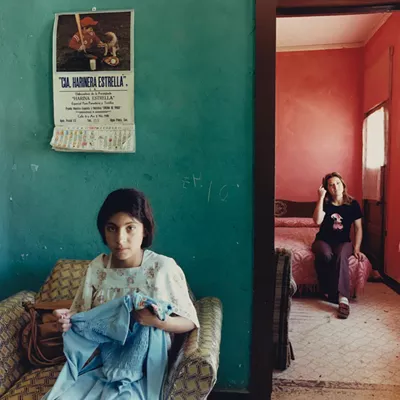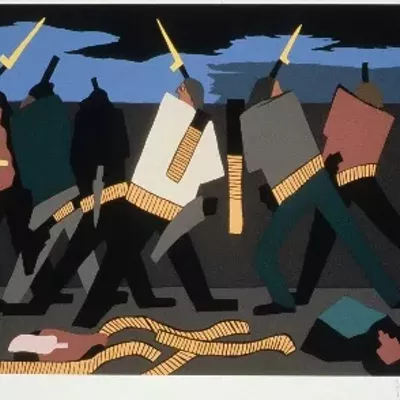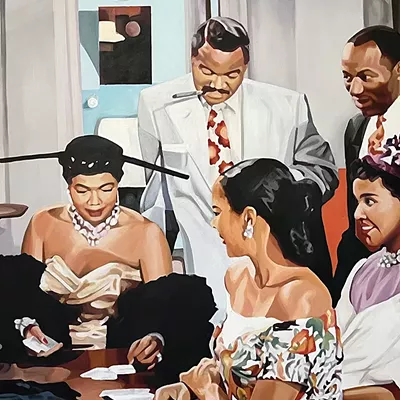But he can hardly be blamed for his hyperbole. Now in his 25th year as president or, as he puts it, "dictator for life" of the Arizona Friends of Chamber Music, each season Bierny presents rigorously high-quality classical music in the Old Pueblo with a little help from the Friends. The evening chamber music series, which culminates in an annual festival in March, is now in its 55th season, while the younger Sunday afternoon Piano and Friends is in its eighth. Bierny says there is one theme, and one theme only, for this and every year's chamber music concerts.
"The theme is always: the greatest possible groups from all over the world," he declares at a local café, pulling his spoon out of a bowl of tasty turkey garbanzo soup and waving it in the air for emphasis. As for the Piano and Friends concerts, he says, the musicians are "the cream of the cream of the younger ones."
It's hard to dispute Bierny's geographic contention once you map out the homes of this season's players. Taking to the stage of the Leo Rich Theater will be chamber music groups hailing from Russia, Germany, New York, Colorado and St. Louis. (Amsterdam's Osiris Trio played at the season opener last week. Piano and Friends, which showcases up-and-coming younger musicians, will offer up, among others, two Chinese musicians now resident in the U.S.: Lang Lang, the acclaimed young pianist who wowed Tucson audiences two years ago, and violist Hong-Mei Xiao, now a UA professor.
And most of the musicians come with credentials sufficient to prove Bierny's claim of "greatest."
The attraction at next Wednesday's concert, for instance, the Artemis Quartet of Berlin, was trained by the highly regarded Emerson Quartet, which is now ranked "number one," Bierny says. "Artemis is the greatest young string quartet and they're going to be number one."
Invited back to Tucson after a "fabulous concert" here in early 2001, Artemis will undertake Mendelssohn's Quartet in A Minor, Op. 13 and Dvorák's Quartet in G Major, Op. 106. A third piece will fulfill another Friends fiat: that concerts must include one contemporary piece. Artemis will play György Kurtág's Mikroludien, Op. 13, the first Kurtág ever played in the Friends' long history.
"I'm very happy. This is the first piece we've had by him," Bierny says. "We try to be very careful about the contemporary pieces. We want them to be tonal and have some kind of melody, some kind of structure, not haphazard and disorganized. In other words, good music."
In the last dozen years, the Friends have also made a habit of commissioning new works. At the November 13 concert, Anthony Iannaccone, a 59-year-old American composer, debuts his Clarinet Quintet, to be played by the Arianna String Quartet with clarinetist Richard Stolzman. (Also on the program are Mozart's Quartet in C Major, K. 465, "Dissonance," and Debussy's Quartet in G Minor, Op. 10.)
"It's unique in the United States to have a commissioning program," Bierny says.
A second commissioned piece, a quartet by Robert Maggio, a 38-year-old Pennsylvanian, will make its debut January 8 in a performance by the Colorado String Quartet, now of New York. The new work was sponsored by an audience member "who loves the Colorado," an all-woman band formerly based in Colorado. The quartet will also play Mozart's Quartet in D minor, K. 421, and Beethoven's Quartet in A minor, Op. 132.
The February 19 concert by Russia's St. Petersburg String Quartet dances around the rules. The most contemporary piece will be Prokofiev's 61-year-old Quartet No. 2 in F, Op. 92, and the other two pieces--Shostakovich's Quartet No. 9 in E-flat major, Op. 117, and Haydn's Quartet in C major, Op. 76, No. 3, "Emperor"--are hardly premieres. But the St. Petersburg will fulfill another of the Friends' missions: community service. While in town, Bierny says, the Russians will do a mini-residency with the youth group Tucson Junior Strings, "a wonderful form of cooperation for the community."
The "legendary" Kalishstein-Laredo-Robinson Trio of New York closes out the regular season with a concert April 9, playing Beethoven's Trio in E-flat Major, Op. 44, Schubert's Trio in E-flat Major, D. 929 (Op. 100), and a slightly newer work, Piano Trio in D Minor, by Anton Arensky.
"I love to have them here," Bierny enthuses, noting that the trio will be the resident group for the 2004 festival. The trio is something of a sentimental favorite for Bierny, who first saw its violinist, Jaime Laredo, when the Friends director was a teenager in Brussels. "He's a wonderful violinist, and his wife, Sharon Robinson, is a wonderful cellist."
Bierny says patrons should not be deterred by the fact that season tickets to the chamber music series routinely sell out.
"We always have about 60 tickets for each concert," he says. "Call our box office or just show up."
Piano and Friends tickets are normally easier to get, with the exception of the Lang Lang solo piano concerts March 22 and 23. Young Lang, now 19, has generated superlatives ("stunning," "greatest," "history-making") not just from Bierny but from teachers and critics from London to Beijing. "I'm very lucky I hired him the next day" after his 2000 concert in Tucson, Bierny says. "For that concert I had to turn 100 people away. That's why I've scheduled two concerts this year."
In New York recently, Bierny saw a Lincoln Center concert by a chamber music group that had previously performed for the Friends.
"The magic was not there, in a 2,500-seat hall," he says disdainfully. "There's no way chamber music should be seen in a hall like that." Here in Tucson, in the intimate Leo Rich, music lovers have a chance to hear "world-class chamber music in a wonderful hall."











